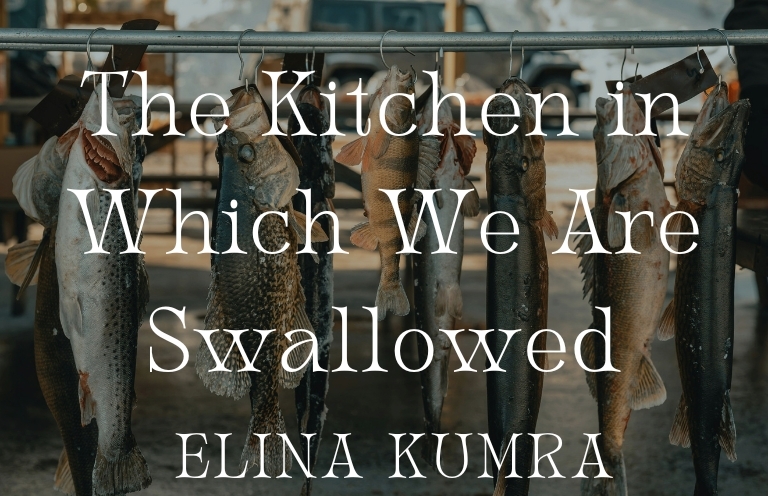“Ma once told me that words in Chinese can slice if you let them—the way a fishhook might snag the corner of your mouth, reeling truth out of you,” is just one of the salient observations in Elina Kumra’s “The Kitchen in Which We Are Swallowed.” In this story, a Chinese family attempts to acclimate to a new country and a new way of life, but with every shortcoming, shame mounts.

I.
We live above the fish market on Canal Street. Each dawn, a brine-laden stench seeps through the floorboards, scaling the walls like a living thing hunting for our throats. My mother pretends not to notice, but at night she coughs so hard her lungs rattle. She calls it the humidity, mumbling in that hushed tone of hers, as if the word alone can silence the truth.
When the trucks arrive at first light, I run to our window. Ice melt trickles across the sidewalk, shimmering with stray scales and broken spines. I watch the fishmongers hoist crates of flailing creatures, the air swirling with desperate gasps and the tang of salt. Sometimes, I imagine collecting each bone, piece by piece, until I have enough to fashion my father a new spine—one that can’t bend with shame, won’t lash out at us.
II.
Before we came here, Baba worked in a noodle shop in Hangzhou—a city I’ve never stepped foot in but can’t stop envisioning in color-soaked dreams. He almost never mentions it, except once, as he chopped scallions in our cramped kitchen, his knuckles resting on the cutting board. “Back then,” he murmured, “my knife never had to shout.” In my mind, I saw a blade with a mouth, crying out with every slice.
That night, I whispered his words to Ma, hoping she’d decode them. She slid the cleaver into the drawer and closed it with a shiver. “Knives,” she said, “should never speak.” Then she turned to me with eyes that pleaded for silence.
III.
The first time I saw him strike her, I was ten. We’d just come back from the library. I clutched a picture book about deep-sea fish, the type with glowing lures dangling in black water. The apartment door had barely clicked shut when I heard a crack like a branch snapping in winter.
My mother’s face twisted. Baba’s still-raised hand shook, as though he wanted to chop it off, but couldn’t bear to.
“Baba.” My voice fell out of me brittle. He spun around, eyes dark and ravenous. A hush pressed against my skull until all I could hear was my heart, drumming, drumming.
IV.
At sunrise, he acted as if nothing had happened. He boiled congee with cubes of sweet potato bobbing in a swirl of steam. My mother’s knuckles bore purple bruises, branching across her skin like a coral reef. She never said a word. The congee blistered the roof of my mouth, but I swallowed, tasting her shame, his guilt, a fear that made my limbs shake under the kitchen table.
Once, she tried to ladle more into my bowl. “I’m full,” I lied, though hunger gnawed at me from the inside.
V.
On Saturdays, I hand out flyers for the fish market. Rain smears ink into dark rivers across my cardboard sign; a drizzle soaks my hair until it clings to my cheeks. I read each Chinese name off the printouts: 鳕⻥ (xuě yú) for cod, 鲑⻥ (guī yú) for salmon, though guī sounds comically like turtle—it always makes me grin in secret.
Ma once told me that words in Chinese can slice if you let them—the way a fishhook might snag the corner of your mouth, reeling truth out of you. I trace the characters under my breath whenever Baba starts to shout, summoning scaled guardians in my chest, each fin bristling to shield me.
VI.
Two nights ago, I found Ma crouched in the light of the kitchen, rummaging through drawers. Her hair stuck to the side of her face with sweat, and I caught the scent of ginger and old fish on her shirt. “Go back to bed,” she said. I asked if she needed help, if Papa was okay.
She shifted away, hugging a battered soup pot to her hip. She’d already stacked our best sesame oil and the jar of soy sauce on the counter. “I’m leaving,” she whispered in Chinese, through trembling lips. Terrified of betraying her, I just stood there, mouth dry, brimming with questions I didn’t dare ask.
VII.
She didn’t go. Not yet. At dawn, Papa woke me, telling me to measure rice in the kitchen. When I looked up, my mother’s eyes flicked over the pot now perched above the fridge. She said nothing, and he didn’t even notice. Later, when he handed me a bowl of leftover congee, I saw a question shadowing his gaze—but I couldn’t bring myself to speak then, either.
VIII.
“Ma?” I ask over dinner. “Why do we stay? Couldn’t we move somewhere else, with fresh air?”
She exhales in a tremor of English, “This is how the world built us.” He twists his chopsticks between his fingers, frowning as though we’re both speaking nonsense. Finally, the hush relents, and we return to the ritual of chewing. Flesh, salt, memory—everything that tastes of regret.
IX.
Sometimes, I picture a grimy tank at the back of the fish market. Maybe I’d climb in and let the water cradle me, algae braiding my ankles. Would Baba follow, his shame rinsed in the swirl? Would Ma stand on the slick edge, deciding if she’ll sink with me or vanish into the night, pot in hand? I see us all suspended, thrashing in the neon, stripped of every grudge. If you drained the water, we’d lie side by side on the floor, gasping for something bigger than air.
X.
In Chinese, “对不起” (duì bù qǐ) means “I can’t face you,” which must be why we never utter it. Instead, we offer each other bowls and spoons—salvage acts neither of us acknowledges. My father ladles soupy rice onto my plate. My mother stands behind my chair, drumming her fingers against the counter. Me, I swallow it all. The congee’s heat stings my throat, yet below the pain, I sense a faint glimmer. Something inside me refuses to sink.
 Elina Kumra is a poet and writer, author of Ash and Olive and Extant. She writes of memory, loss, and resilience in life’s quiet ruptures. Her words are spare and sure, each one carrying its quiet weight. Her poems and stories have appeared in magazines at home and abroad, and her work has earned recognition from literary organizations. She teaches poetry and believes words can heal and bear witness.
Elina Kumra is a poet and writer, author of Ash and Olive and Extant. She writes of memory, loss, and resilience in life’s quiet ruptures. Her words are spare and sure, each one carrying its quiet weight. Her poems and stories have appeared in magazines at home and abroad, and her work has earned recognition from literary organizations. She teaches poetry and believes words can heal and bear witness.
